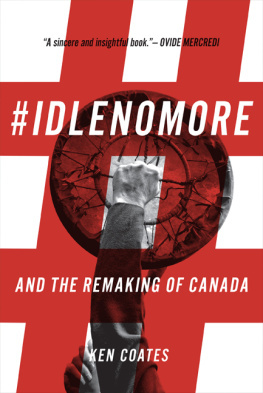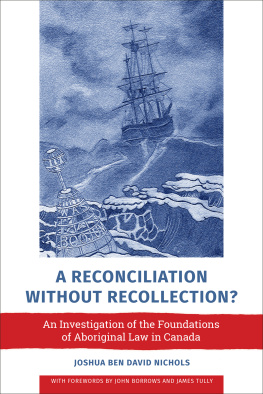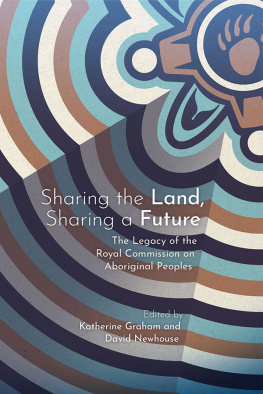Patrick Macklem - Indigenous Difference and the Constitution of Canada
Here you can read online Patrick Macklem - Indigenous Difference and the Constitution of Canada full text of the book (entire story) in english for free. Download pdf and epub, get meaning, cover and reviews about this ebook. year: 2015, publisher: University of Toronto Press, genre: Politics. Description of the work, (preface) as well as reviews are available. Best literature library LitArk.com created for fans of good reading and offers a wide selection of genres:
Romance novel
Science fiction
Adventure
Detective
Science
History
Home and family
Prose
Art
Politics
Computer
Non-fiction
Religion
Business
Children
Humor
Choose a favorite category and find really read worthwhile books. Enjoy immersion in the world of imagination, feel the emotions of the characters or learn something new for yourself, make an fascinating discovery.

- Book:Indigenous Difference and the Constitution of Canada
- Author:
- Publisher:University of Toronto Press
- Genre:
- Year:2015
- Rating:3 / 5
- Favourites:Add to favourites
- Your mark:
- 60
- 1
- 2
- 3
- 4
- 5
Indigenous Difference and the Constitution of Canada: summary, description and annotation
We offer to read an annotation, description, summary or preface (depends on what the author of the book "Indigenous Difference and the Constitution of Canada" wrote himself). If you haven't found the necessary information about the book — write in the comments, we will try to find it.
An investigation of the unique constitutional relationship between Aboriginal people and the Canadian state, a relationship that does not exist between Canada and other Canadians.
Indigenous Difference and the Constitution of Canada — read online for free the complete book (whole text) full work
Below is the text of the book, divided by pages. System saving the place of the last page read, allows you to conveniently read the book "Indigenous Difference and the Constitution of Canada" online for free, without having to search again every time where you left off. Put a bookmark, and you can go to the page where you finished reading at any time.
Font size:
Interval:
Bookmark:
INDIGENOUS DIFFERENCE AND THE CONSTITUTION OF CANADA
There is a unique constitutional relationship between Aboriginal people and the Canadian state a relationship that does not exist between other Canadians and the state. It is from this central premise that Patrick Macklem builds his argument in this controversial work.
Why does this special relationship exist? What does it entail in terms of Canadian constitutional order? There are, Macklem argues, four complex social facts that lie at the heart of the relationship. First, Aboriginal people belong to distinctive cultures that were and continue to be threatened by non-Aboriginal beliefs, philosophies, and ways of life. Second, prior to European contact, Aboriginal people lived in and occupied North America. Third, prior to European contact, Aboriginal people not only occupied North America; they exercised sovereign authority over persons and territory. Fourth, Aboriginal people participated in and continue to participate in a treaty process with the Crown. Together, these four social conditions are exclusive to the Aboriginal people of North America and constitute what Macklem refers to as indigenous difference.
Exploring the constitutional significance of indigenous difference in light of the challenges it poses to the ideal of equal citizenship, Macklem engages an interdisciplinary methodology that treats constitutional law as an enterprise that actively distributes power, primarily in the form of rights and jurisdiction, among a variety of legal actors, including individuals, groups, institutions, and governments. On this account, constitutional law refers to an ongoing project of aspiring to distributive justice, disciplined but not determined by text, structure, or precedent. Far from threatening equality, constitutional protection of indigenous difference promotes equal and therefore just distribution of constitutional power.
The book examines constitutional rights to Aboriginal people that protect interests associated with culture, territory, sovereignty, and the treaty process, and explores the circumstances in which these rights can be interfered with by the Canadian state. It also examines the relation between these rights and the Canadian Charter of Rights and Freedoms, and proposes extensive reform of existing treaty processes in order to protect and promote their exercise.
Macklems book offers a challenge to traditional understandings of the constitutional status of indigenous peoples, relevant not only to Canadian debates but also to those in other parts of the world where indigenous peoples are asserting greater autonomy over their collective futures.
PATRICK MACKLEM is Professor of Law, University of Toronto.
PATRICK MACKLEM

University of Toronto Press 2001
Toronto Buffalo London
Printed in the U.S.A.
Reprinted 2002, 2007, 2012
ISBN 0-8020-4195-7 (cloth)
ISBN 0-8020-8049-9 (paper)

Printed on acid-free paper
Canadian Cataloguing in Publication Data
Macklem, Patrick
Indigenous difference and the Constitution of Canada
Includes bibliographical references and index.
ISBN 0-8020-4195-7 (bound) ISBN 0-8020-8049-9 (pbk.)
1. Indians of North America Legal status, laws, etc. Canada.
2. Indians of North America Canada Government relations.
3. Indians of North America Civil rights Canada.
4. Constitutional law Canada. I. Title.
E92.M335 2001 323.1197071 C00-932065-2
This book has been published with the help of a grant from the Humanities and Social Sciences Federation of Canada, using funds provided by the Social Sciences and Humanities Research Council of Canada.
The University of Toronto Press acknowledges the financial assistance to its publishing program of the Canada Council for the Arts and the Ontario Arts Council.
University of Toronto Press acknowledges the financial support for its publishing activities of the Government of Canada through the Book Publishing Industry Development Program (BPIDP).
For my parents, Joy and Peter Macklem
This book has been some years in the making and has benefited from the insights, expertise and wisdom of many colleagues and friends. I am grateful in this respect to Joe Arvay, Michael Asch, Joe Corbiere, Ren Dussault, Georges Erasmus, the late, great Norman Feltes, Phil Healey, Bill Henderson, Martin Henderson, David Kennedy, Duncan Kennedy, Karl Klare, Will Kymlicka, Tara Letwiniuk, Rod Macdonald, Kent McNeil, Jim Morrison, Stephen ONeill, Cathie Parker, Andrew Petter, Tony Reynolds, Peter Russell, Michael Trebilcock, Mary Ellen Turpel-Lafond, Catherine Twinn, Jack Woodward, and Kevin Worthen. I would also like to thank the many students who enrolled in my courses at the Faculty of Law, University of Toronto, over the last several years for testing and clarifying many ideas and arguments. I am particularly grateful to colleagues and friends Jim Anaya, Joel Bakan, David Beatty, John Borrows, Sujit Choudhry, Gina Cosentino, Dennis Davis, Gus Gibbon, Moira Gracey, Robert Howse, Allan Hutchinson, Ralph Keesickquayash, Karen Knop, Bruce Ryder, David Schneiderman, Joe Singer, Brian Slat-tery, Kerry Wilkins, David Wiseman, and especially Lisa Austin, Sonia Lawrence, and Mia London who read an earlier draft of this book and offered extensive and constructive criticisms.
I am indebted to Robert Corbiere, Debbie Maiangowi, Farrell Manitowabi, Henry Peltier, Cecilia Pitawanakwat, Peggy Pitawanakwat, Jim Recollet, Gladys Wakegijig, and Ron Wakegijig of the Wikwemikong Unceded Indian Reserve for introducing me to the mysteries of Manitoulin Island, and Esther Osche of the Whitefish River First Nation for revealing the mountain within. I also owe a special debt of appreciation to Courtney Milne and Sherrill Miller, for their vision and grace.
This book could not have been written without the active encouragement of my colleagues at the Faculty of Law, University of Toronto, especially Dean Ron Daniels, whose personal and institutional support has been invaluable. I am also grateful for the hospitality of the faculty and administration of the UCLA School of Law, where I was a visiting scholar in 1992 and where, without knowing it at the time, this project was first conceived. The librarians at the Bora Laskin Law Library at the University of Toronto and the Newberry Library in Chicago, Illinois, provided valuable research assistance, and the Social Sciences and Humanities Research Council of Canada and the University of Toronto Connaught Committee provided generous financial assistance. I would also like to thank Andrew Wilson for his last-minute research assistance, Allyson May, Heather Ritchie, and Barbara Schon for their editorial assistance, and Virgil Duff and Anne Laughlin of the University of Toronto Press for skilfully shepherding the book through to publication.
Many of the ideas in this book have been presented at workshops and conferences sponsored by the Centre for Applied Legal Studies at the University of the Witwatersrand, the Department of Political Science at the University of Toronto, the Faculty of Law at Tel-Aviv University, the Faculty of Law at the University of Windsor, Harvard Law School, the Institute for the Study of Canada at McGill University, the Program in Latin American Studies at Princeton University, the Robarts Centre for Canadian Studies at York University, and the UCLA American Indian Studies Center. I am grateful to those institutions for affording me the opportunity to test my ideas and to participants for their valuable comments and thoughtful criticisms. Parts of the book build on but significantly revise work previously published in the
Next pageFont size:
Interval:
Bookmark:
Similar books «Indigenous Difference and the Constitution of Canada»
Look at similar books to Indigenous Difference and the Constitution of Canada. We have selected literature similar in name and meaning in the hope of providing readers with more options to find new, interesting, not yet read works.
Discussion, reviews of the book Indigenous Difference and the Constitution of Canada and just readers' own opinions. Leave your comments, write what you think about the work, its meaning or the main characters. Specify what exactly you liked and what you didn't like, and why you think so.






